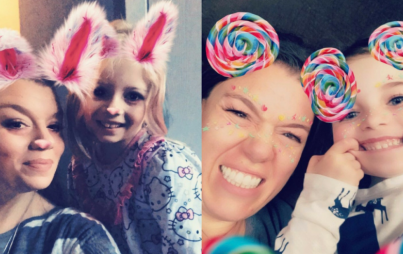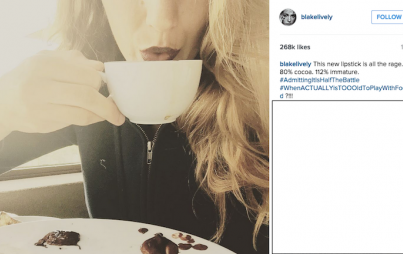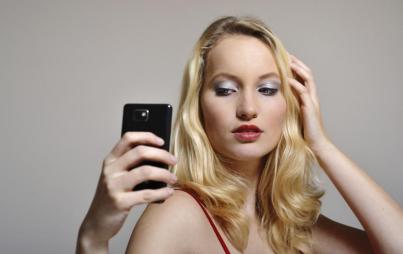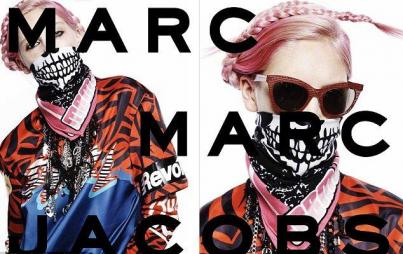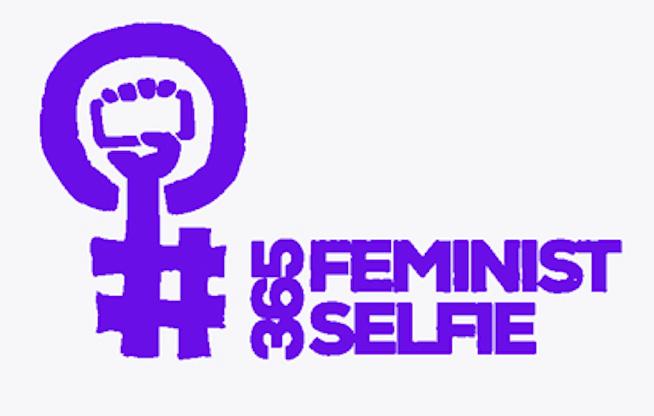
#365FeministSelfie
The project now has a logo and a fundraising shirt. Arreola talked about the hope that women can learn “to love that one little thing that they grew up hating,” and then reframe how they see it.
For the past twenty months, Veronica Arreola has been the driving force on a project that has the hybridity of an art installation mixed with a political action. It rests at the intersection of identity, culture, social issues, and feminism.
I first saw the hashtag #365FeministSelfie on Twitter, in Jennifer Pozner’s stream (@jennpozner). Pozner, the Founder and Executive Director of Women In Media, has been active in monitoring and commenting on the way in which women are viewed in society. Her book, Reality Bites Back: The Troubling Truth about Guilty Pleasure TV, examines how reality televisions shows shape our conceptions about women. A prime example was The Swan, where plastic surgeons “fixed” ugly ducklings through extreme makeovers.
Arreola saw the #365FeministSelfie as an antidote to these unrealistic conceptions and expectations, as she wrote in her December 31, 2013 post, #365FeministSelfie — Are you in?”
I recently contacted Arreola by telephone to find out how the #365FeministSelfie undertaking is progressing. Arreola told me that she believes selfies can function as a record of how real women and girls operate in the world, a kind of tribute to self-esteem. Activities in the photos can range from women at the start of their day, dealing with their children, or sprawled in a chair exhausted after eight hours at work. They document women in dressing rooms, without makeup, sporting a new hat, or dressed to the nines. In Arreola’s estimation, these are all “photo worthy.”
The Director of Women in Science and Engineering at the University of Illinois and mother to a 12-year-old daughter, Arreola sees the #365FeministSelfie as striking a chord with girls who are beginning to explore who they are and women who are growing older and beginning to feel invisible, encompassing all those at various heights, weights, and skin shades. It reaches all kinds of women: Straight, lesbian or bi-sexual; living with physical or mental illness; cisgender or transgender.
The project now has a logo and a fundraising shirt. Arreola talked about the hope that women can learn “to love that one little thing that they grew up hating,” and then reframe how they see it.
Gay women, in shots with their partners or wives, have contributed numerous photographs. Arreola suggested they are informing the world, “This is what a lesbian’s life looks like.” Arreola noted that frequently, women in the LGBT space used selfies to “come out to themselves.”
We spoke about trans women and their desire to present themselves in their own fashion — whatever they determine that is. Obviously, it is difficult to achieve acknowledgment in a society that still looks at gender in a binary way.
Arreola has done outreach with participants to get an overview of who is involved, and has observed various patterns. There is an overlap between the #365FeministSelfie hashtag and the #BlackLivesMatter hashtag. Sub-groups and threads have emerged, such as women dealing with illness (see @chronicbabe) who frequently upload photos taken in the exam rooms during doctor visits.
An upcoming photography exhibit is being developed. “We’re doing a public sociology interrogation of what it means to be a feminist — looking at what feminists do on a daily basis,” said Arreola.
Don’t expect the usual celebrity suspects! Participants are folks from across the workplace continuum. Arreola expressed how she was surprised to see a selfie where a woman was situated in her place of employment, which was a hardware store. “Even I have preconceived notions,” she added.
The #365FeministSelfie can be found on Flickr, Facebook, Instagram, Pinterest, and Twitter. A retreat in Columbus, Ohio on November 7 and 8 is in the works.
Some contributors post photos every day, while others take selfies daily and then create a weekly collage. Many share their images publicly, while others use a private thread.
Reflecting on the bandwidth of the engagement, Arreola said, “We’re everywhere, even in red states!”
The final thought that Arreola left me with was, “Just use the hashtag and join the party!”



